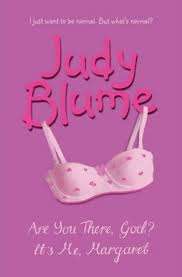Are You There, God? It's Me, Margaret.

It's the the 1960s and Margaret, the protagonist of this book, is a sixth-grade girl who is struggling over the issue of faith. Her mother is a Christian and her father is Jewish, but up until that point she considered herself non-religious. She also deals with the issues of growing up and puberty, such as periods, liking boys, getting her first bra and being jealous of girls who grew breasts sooner, hence the book cover.
Are You There God? It's Me, Margaret. is generally considered to be a Young Adult novel and was written by Judy Blume in 1970. Because it has puberty and the questioning of religious faith as a large part of its subject matter, it was also subsequently banned from many school libraries and reading lists.
In late-2018, Judy Blume finally stopped saying "no" to film and TV adaptations of the book. Nothing has been announced, but the possibility is now open.
- A-Cup Angst: A major plot point is Margaret and her friends being frustrated over the fact that they haven't started developing breasts yet.
- Big Breasts, Big Deal / Buxom Is Better: The former is both a Type 1 and a Type 2 with Laura Danker, while the latter is both played straight and subverted. A major plot point is Margaret and other girls being frustrated at not having developed breasts yet and being jealous of Laura having already developed large breasts. However, she dislikes them because they get her made fun of and a lot of unwanted male attention.
- Coming of Age Story
- Cool Old Lady: Margaret's Jewish grandmother.
- Fake Boobs: Cotton balls.
- Fascinating Eyebrow: Margaret can raise one eyebrow and does it occasionally to get adults to stop asking her questions. She doesn't know why it has that effect, but it does.
- Four-Girl Ensemble: More like the "Four Pre-Teen Sensations" — Gretchen is the somewhat mannish one, Janie is shy and sweet, Nancy is a bit of a slut wannabe, and Margaret is the narrator who sees everything.
- Green-Eyed Monster: Prominent throughout the book. Margaret is continuously jealous of various factors involved with puberty; Laura Denker having large breasts, her crush paying attention to other girls, and not getting her period before her friends.
- Hormone Addled Preteens: The book was written in 1970 when it was taboo to talk about puberty outside of health class, so at the time Margaret and her friends may have come off as one of these.
- I Have No Son: Or I have no daughter, or I have no son in law. Part of the plot involves Margaret's grandparents on her mother's side disowning her mother because they are religious bigots and did not want her to marry Margaret's Jewish father. This is why Margaret is raised with no religion. They later express a desire to reconcile, though only with her, and not the father, whom they don't even mention in their letter and act as if doesn't exist when they come to visit. When they leave it's implied they still haven't fully reconciled with her yet.
- Jewish Grandmother
- The Joy of X: Are You There, God? It's Me, X The originator of this variant.
- Moral Guardians: None of the potential reasons for banning this book were very good. Nowadays at least. Is it bad to have an open, but non-religious relationship with God? Is it possible that by not letting your daughters read a tasteful first-hand account of puberty, it will end up like smoking and drugs and be one of those things that they never do?
- Naive Everygirl: Margaret.
- She's actually listed as an alternate name on the trope's page!
- No Periods, Period: The puberty exception. This is a major plot point of the book. Margaret and her friends are greatly looking forward to starting their periods and are frustrated that they haven't, to the point where Nancy lies about getting hers. Margaret gets extremely upset as her two friends get theirs before she does. She ends up being the next to last one to get hers. Also, Nancy gets extremely upset when she does get hers for real.
- Educating girls about menstruation seems to have been an important part of the book: the newer editions have even been updated so that, instead of describing belts and such, Margaret now uses modern sanitary napkins.
- She's All Grown Up: Not fully played out in the usual way, but Margaret's father tells her this after she starts wearing bras.
- The Sixties: The novel takes place in this time period, although it was written right at the start of The Seventies.
- Spin the Bottle: The girls play this game with their classmates at a birthday party, but come to the conclusion that it's lame and decide to play "two minutes in the closet" instead.
- Sweater Girl: Laura Danker wears one of these because she's the only one in her sixth grade class with breasts big enough to pull this trope off.
- Ten Minutes in the Closet: Margaret and her classmates play this at a birthday party, except it's "Two Minutes in the Closet", and they don't have a big enough closet, so they use a bathroom instead.
- Wanton Cruelty to the Common Comma: God is being addressed. Therefore, it should be Are You There, God? This has bugged readers for decades. Some newer editions have altered the title to account for this.